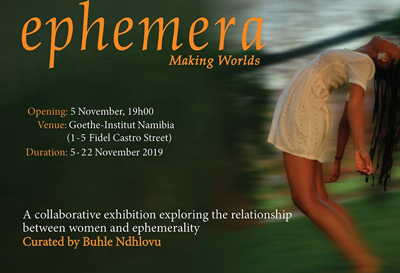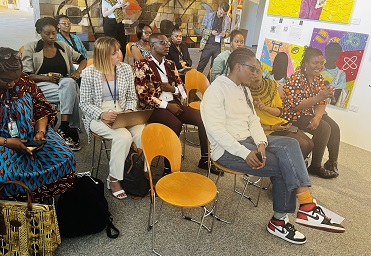
Exhibition and performance which explores the relationship between woman’s body and social constructions such as gender to take place at Goethe-Institut.

Ephemera, a performance and art exhibition by Bupe Chiwala, Neige Moongo and Julia Hango (JuliArt) will take place on 5 November at 19:00 at the Goethe-Institut Namibia.
Ephemera explores the relationship between woman’s body and social constructions such as gender in Namibia. Ephemera is curated by Buhle Ndhlovu, a participant of the Curatorship Boot-camp that was held earlier this year.
Ndhlovu said two of the performances will be staged and recorded during the opening, unique aspect that enables viewers to continue encountering the ephemera.
“Owning to the fact that performance art is transitory, video recordings are employed to enable the artists to continue to represent their work after it is performed, and for the viewers to continue encountering the ephemera,” she added.
She further explained that the topic is relevant to Namibia because the quality of women’s lives, including what opportunities they can purse, to measure of autonomy they can exercise over their lives, their selves and bodies, is heavily inflected by the socio-political and cultural landscape. “The exhibition enables us to theorize this and imagine whether the status quo is subject to change, and if so, how?” she emphasised.
She highlighted that exhibition also centres women’s agency and freedom to give meaning to the world, their prerogative to petition for the meaning to have status, and more importantly, how essential women’s contribution is to re-imaging and re-designing new and different futures and presents.
JuliArts said her performance is highly provocative and call attention to the continued gender inequality in particularly the Aawambo culture but also, within Namibia at large, by questioning the double patriarchal standards’ exerted by certain African cultural structures and Colonial Christianity.
Chiwala said thinking about ephemera allows them to interrogate their relationship to things, particularly things that do not stick around forever, and how these things may leave emotional, historical or physical trace.
“Ephemerality allows us to consider how important it is for us to let go of things and how things are constantly in a state of flux, simultaneously becoming and decaying,” said Moongo. She further elaborated that how total loss and total possession are fantasies, which highlights how temporary things can be meaningful. “This speculation functions as a bridge and a practice which enables us to weigh and deliberate alternatives for us to re-image and re-define our relationship to time, space, place, the present, the past and the future,” she concluded.
The exhibition will be open until 22 November.











































